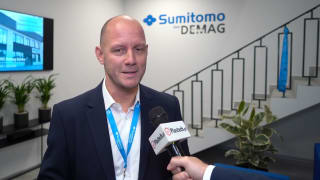 Bayer MaterialScience pioneers polyurethane resin transfer molding for composites with added strength, eco-friendliness.
Bayer MaterialScience pioneers polyurethane resin transfer molding for composites with added strength, eco-friendliness.For decades, the resin transfer molding (RTM) process has been a preferred method for manufacturing composite parts. Resins used in the process have traditionally included polyester, vinylester and epoxy, to name a few. However, Bayer MaterialScience LLC, a leader in polyurethane technology, is pioneering the use of polyurethane resin in the RTM technology process.
In the RTM process, a fiberglass mat is placed in a two-sided mold. The mold is closed, and polyurethane resin is injected into it. Once the part cures, the mold is opened and the finished part removed.
A new variation of resin transfer molding technology is vacuum-assisted resin transfer molding (VARTM), a process in which the resin is "pulled" by vacuum into the mold - rather than injected - as a means of fiber wetting. The VARTM process ensures complete wetout of the fiberglass mat, infusing it with the polyurethane resin to eliminate dry spots that can cause defects.
One major advantage of using polyurethane resin in the RTM and VARTM processes is that it offers improved physical properties compared with other resins such as unsaturated polyester or vinylester. In fact, the strength and stiffness properties of polyurethane are greater than those of polyester resins.
Polyurethane resin is also a more environmentally friendly alternative to other types of resins such as polyester, which contains VOC-emitting styrene as well as peroxide catalysts that require energy-consuming refrigeration.
The superior toughness of composite parts manufactured using polyurethane in the RTM and VARTM processes has opened the technology up to completely new markets, including ballistics and sporting goods applications.
- As we continue to explore the advantages of polyurethane processes at Bayer MaterialScience, we have extended the benefits of polyurethane into the resin transfer molding and vacuum-assisted resin transfer molding processes in order to arrive at composites with unsurpassed strength and durability - said Craig Snyder, market channel representative, Bayer MaterialScience LLC. - The benefit of Bayer MaterialScience`s extensive polyurethane expertise, combined with our renowned hands-on technical support, makes polyurethane RTM and VARTM technology an exciting option for composites manufacturers - added Snyder.
Bayer MaterialScience LLC is one of the leading producers of polymers and high-performance plastics in North America and is part of the global Bayer MaterialScience business with nearly 15,400 employees at 30 sites around the world and 2007 sales of 10.4 billion euros. Business activities are focused on the manufacture of high-tech polymer materials and the development of innovative solutions for products used in many areas of daily life. The main segments served are the automotive, electrical and electronics, construction, medical, and sports and leisure industries. Our inorganic basic chemicals unit produces chlorine and related essential products for the chemicals industry.


